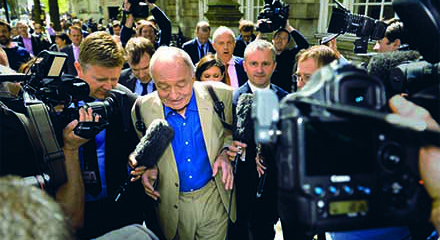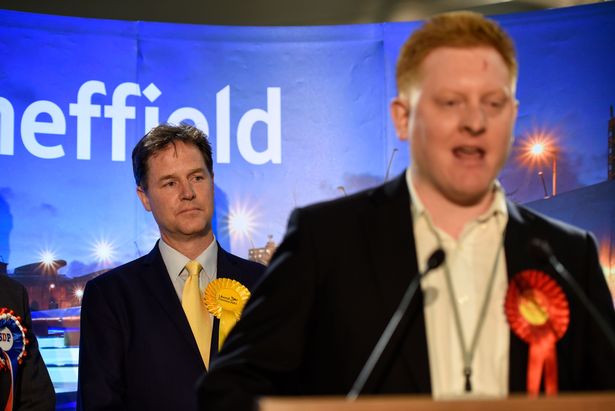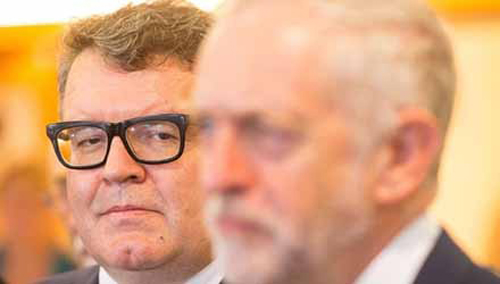The Jewish Labour Movement claims its rule change has been adopted by the Labour Party NEC, Kat Gugino begs to differ
On September 18, The Guardian claimed that Corbyn would be “backing” a rule change to this year’s Labour Party conference, moved by the Jewish Labour Movement.1)The Guardian September 18 Lo and behold, on September 19, the Jewish Chronicle joyfully reported that the Labour Party’s national executive committee, meeting earlier in the day, “unanimously” passed the JLM’s proposal.2)www.thejc.com/news/uk-news/labour- executive-gives-backing-to-new-measures-on- antisemitism-1.444751 Leftwing NEC member Darren Williams, however, writes on social media that “we approved an NEC rule change on dealing with prejudiced views and behaviour that avoided the more draconian approach favoured by the Jewish Labour Movement”. So who is telling the truth?
Well, that depends on who you ask and what question you ask. Clearly, the JLM’s fingerprints are all over the NEC compromise formulation (see below for the full text). The Jewish Chronicle quotes in its article “a spokesman from Jeremy Corbyn” as saying: “Jeremy thanks all those involved with drafting this motion, including the Jewish Labour Movement and Shami Chakrabarti.”
It is true, however, that the original JLM motion was not accepted. Tony Greenstein, a frequent writer in the Weekly Worker, believes the new formulation might simply represent a “pyrrhic victory” for the JLM. And he is right that one of the key aspects of the original motion was rejected: the JLM wanted a “hate incident” to be “defined as something where the victim or anyone else think it was motivated by hostility or prejudice based on disability, race, religion, transgender identity, or sexual orientation” (our emphasis).
This was a rather clumsy attempt by the JLM to misuse the recommendations of the MacPherson report, established after the killing of Stephen Lawrence, which found the police to be “institutionally racist”. MacPherson recommended that when a victim or someone else perceives an attack or hate incident as racially motivated, then the police must record it as such.
In that sense, the JLM has failed in its outrageous attempt to enshrine in the party’s rules that the Labour Party is institutionally anti-Semitic! The NEC formulation enshrines the need for at least some kind of evidence: “any incident which in their view might reasonably be seen to demonstrate hostility or prejudice”. The JLM also failed in their attempt to explicitly enshrine the disciplining of members for comments or actions made in “private”.
If successful, the motion would have handed Iain McNicol and the compliance unit a devastatingly effective witch-hunting app: members could have been explicitly punished on the basis of what others perceive to be their motivation for specific comments or actions, not what is was actually done or stated.
JLM threats
Take the following threat from the JLM that we have received via a bourgeois journalist. Lucy Fisher, senior political correspondent of The Times, wrote to us on September 18:
“I was hoping to talk to someone at Labour Party Marxists about your conference voting guide, which we propose to report on tomorrow. The Jewish Labour Movement has expressed concern about lines in the document such as:
“‘This is supported by the Jewish Labour Movement, which already tells you that you should oppose without even having to read it.’
“‘The motion starts from the premise that the party has an “anti-Semitism problem”, which is palpably untrue.’
“‘This motion puts anti-Semitism (and cleverly, Islamophobia and racism) above the right to express opinions.’
“The chairman of the Jewish Labour Movement [presumably Jeremy Newmark] has said the document provides ‘an indication of the scale of the problem’ of anti-Semitism in Labour and has called on Labour to establish who is involved in your group, take action to discipline those involved and remove any representative platform from the group at conference.”
As you would expect from a reporter who works for a newspaper hostile to the left, Lucy has forgotten the word “probably” in the first sentence and is quoting half-sentences from our guide – and those entirely out of context. Still, even then, anybody apart from Jeremy Newark will struggle to find anything “anti- Semitic” in the above sentences.
Had Newmark had his way, then the mere fact that he feels we are acting out of “hostility or prejudice” would have been enough to see LPM members sent to the compliance unit. As the NEC formulation stands, this will not be enough.
Thinking bad things
Of course, Newmark is right: we are hostile to the Jewish Labour Movement. The JLM is, of course, an affiliate to the World Labour Zionist Movement, a loyal supporter of the state of Israel and home to many of those who have been so keen to save the Labour Party from its ‘unelectable’ leader.
Unfortunately, we are seeing yet another compromise that has characterised much of Jeremy Corbyn’s leadership. Clearly, Corbyn and his allies seem to believe that they can pacify saboteurs and achieve ‘party unity’ by giving ground on these sorts of issues. This is dangerously naive. The outcome of the Chakrabarti enquiry showed the opposite to be true. The witch-hunters’ appetite will grow in the eating.
The worst excesses of the JLM motion (which, worryingly, also successfully went through six CLPs) have been removed, yes. But the fact remains that the NEC – and Corbyn – now seem to accept, albeit implicitly, the premise that Labour does indeed have an anti-Semitism problem. That is palpably untrue. It clearly does have an anti-left witch-hunt problem, as the suspensions of Ken Livingstone, Jackie Walker, Tony Greenstein and others clearly demonstrate. No doubt there are a minuscule number of individual members who hold anti- Semitic views – most of whom you would expect to belong to the party right, by the way. Labour is not some chemically pure ideological sect of a few hundred acolytes. We are a mass movement and therefore, to varying levels, may find in our ranks trace elements of some irrational minority prejudices that exist in wider society. The party – or, more specifically, the Labour left – has no more of an institutional anti-Semitism ‘problem’ than we have a problem with paranoid notions that 9/11 was an inside job or that shape- shifting space lizards run the world.3)All genuine manifestations of the poison of anti- Semitism must be fought vigorously. However, it accounts for a small very small percentage of ‘hate crimes’ in this country. The House of Commons home affairs committee published an October 2016 report, ‘Anti-Semitism in the UK’, noting that anti-Semitic hate crimes, however defined, total 1.4% of all racially inspired attacks. In the first half of the year there had been a rise of 11% in anti-Semitic incidents, compared with 2015. Numerically, this rise was from 500 to 557. However, 24% of the total – 133 incidents in all – were on social media. And social media accounted for 44 out of the increase of 57
Clearly, the huge scale of the ‘scandal’ that broke over members in 2016 (and still reverberates) is actually in inverse proportion to the real size of the problem itself. Even at the height of the feverish hunt for ‘anti-Semites’, the NEC only ‘identified’ and took action against a grand total of 18 members.4)Labour List May 4 2016 Quite a few (like MP Naz Shah) were fully reinstated. Others, like Ken Livingstone and Jackie Walker, should be fully reinstated – nothing they said was even vaguely anti-Semitic.
In truth, we are in Alice in Wonderland territory here – or rather, Humpty Dumpty’s corner of it and his fast and loose approach to semantics.5)“When I use a word,” Humpty Dumpty said, in rather a scornful tone, “it means just what I choose it to mean – neither more nor less.” Sections of the right of the party – with quite stomach-churning cynicism – have attempted to rebrand as ‘anti- Semitism’ even the discussion of some sensitive, but real facts of Zionism’s relationship with the early Nazi regime and the left’s critical stance on the Israeli state’s savage oppression of the Palestinian people.
The latter is a particularly smart move on behalf of the witch-hunters. With a few dishonourable exceptions,6)The Alliance for Workers’ Liberty, for instance the Labour left is highly critical of the Israeli state’s ongoing colonial/expansionist oppression of the Palestinians and the appalling discrimination, displacement and denial of basic democratic rights that go with it. However, it is a crude and transparently false conclusion to draw from this that the left of the party wishes to see the poles of oppression simply reversed. There are different strategic approaches amongst comrades in solidarity with the Palestinian people (a single secular state, two viable state formations, etc). But a common theme of the left is the need for democratic consent of these two peoples to live side by side, sharing common, substantive democratic rights. In other words, the left in the party is overwhelmingly anti-Zionist, not anti-Semitic. These two very distinct categories have been conflated for the most contemptible of reasons. In the struggle between the left and right for the soul of the party, ‘anti-Semitism’ has been “weaponised”, as Chris Williamson MP quite rightly put it.7)The Guardian September 18 It has proved to be a successful tool in the drawn-out campaign to destabilise Jeremy Corbyn. Historically, Corbyn has been an ardent supporter of Palestinian rights. Worryingly, we are not sure where he stands now. It is probably fair to say that his stance has become more ‘flexible’.
We sincerely hope he has not come around to the stance of the national policy forum. The NPF is recommending a document to this year’s conference that would dramatically change the party’s stance on the question of Israel/Palestine. The 2017 election manifesto called for an end to Israel’s blockade, illegal occupation and settlements. But these basic democratic demands have been dropped, along with the pledge that “A Labour government will immediately recognise the state of Palestine”.
We would urge delegates to vote to refer back the NPF international document.
Original rule change proposed by Jewish Labour Movement
Bury South, Chipping Barnet, Hertsmere, Jewish Labour Movement, Manchester Withington, Streatham, Warrington South, referencing: Chapter 2, Clause I, Section 8 Conditions of membership, Page 9.
After the first sentence add a new sentence: A member of the Party who uses anti-semitic, Islamophobic, racist language, sentiments, stereotypes or actions in public, private, online or offline, as determined by the NEC, shall be deemed to have engaged in conduct prejudicial to the Party.
Add at the end of the final sentence after “opinions”: except in instances involving antisemitism, Islamophobia or racism.
Insert new paragraph E: Where a member is responsible for a hate incident, being defined as something where the victim or anyone else think it was motivated by hostility or prejudice based on disability, race, religion, transgender identity, or sexual orientation, the NEC may have the right to impose the appropriate disciplinary options from the following options: [same as D]
New proposed section on ‘Conditions of Membership’ (Chapter 2, Clause 1, Section 8) new additions in [brackets]
No member of the Party shall engage in conduct which in the opinion of the NEC is prejudicial, or in any act which in the opinion of the NEC is grossly detrimental to the Party. [The NEC shall take account of any codes of conduct currently in force and shall regard any incident which in their view might reasonably be seen to demonstrate hostility or prejudice based on age; disability; gender reassignment or identity; marriage and civil partnership; pregnancy and maternity; race; religion or belief; sex; or sexual orientation as conduct prejudicial to the Party: these shall include but not be limited to incidents involving racism, antisemitism, Islamophobia or otherwise racist language, sentiments, stereotypes or actions, sexual harassment, bullying or any form of intimidation towards another person on the basis of a protected characteristic as determined by the NEC, wherever it occurs, as conduct prejudicial to the Party.] Any dispute as to whether a member is in breach of the provisions of this sub-clause shall be determined by the NCC in accordance with Chapter 1 Clause IX above and the disciplinary rules and guidelines in Chapter 6 below. Where appropriate the NCC shall have regard to involvement in financial support for the organisation and/or the activities of any organisation declared ineligible for affiliation to the Party under Chapter 1.II.5 or 3.C above; or to the candidature of the members in opposition to an officially endorsed Labour Party candidate or the support for such candidature. The NCC shall not have regard to the mere holding or expression of beliefs and opinions [, except in any instance inconsistent with the Party’s aims and values, agreed codes of conduct, or involving prejudice towards any protected characteristic.]
References
| ↑1 | The Guardian September 18 |
|---|---|
| ↑2 | www.thejc.com/news/uk-news/labour- executive-gives-backing-to-new-measures-on- antisemitism-1.444751 |
| ↑3 | All genuine manifestations of the poison of anti- Semitism must be fought vigorously. However, it accounts for a small very small percentage of ‘hate crimes’ in this country. The House of Commons home affairs committee published an October 2016 report, ‘Anti-Semitism in the UK’, noting that anti-Semitic hate crimes, however defined, total 1.4% of all racially inspired attacks. In the first half of the year there had been a rise of 11% in anti-Semitic incidents, compared with 2015. Numerically, this rise was from 500 to 557. However, 24% of the total – 133 incidents in all – were on social media. And social media accounted for 44 out of the increase of 57 |
| ↑4 | Labour List May 4 2016 |
| ↑5 | “When I use a word,” Humpty Dumpty said, in rather a scornful tone, “it means just what I choose it to mean – neither more nor less.” |
| ↑6 | The Alliance for Workers’ Liberty, for instance |
| ↑7 | The Guardian September 18 |







